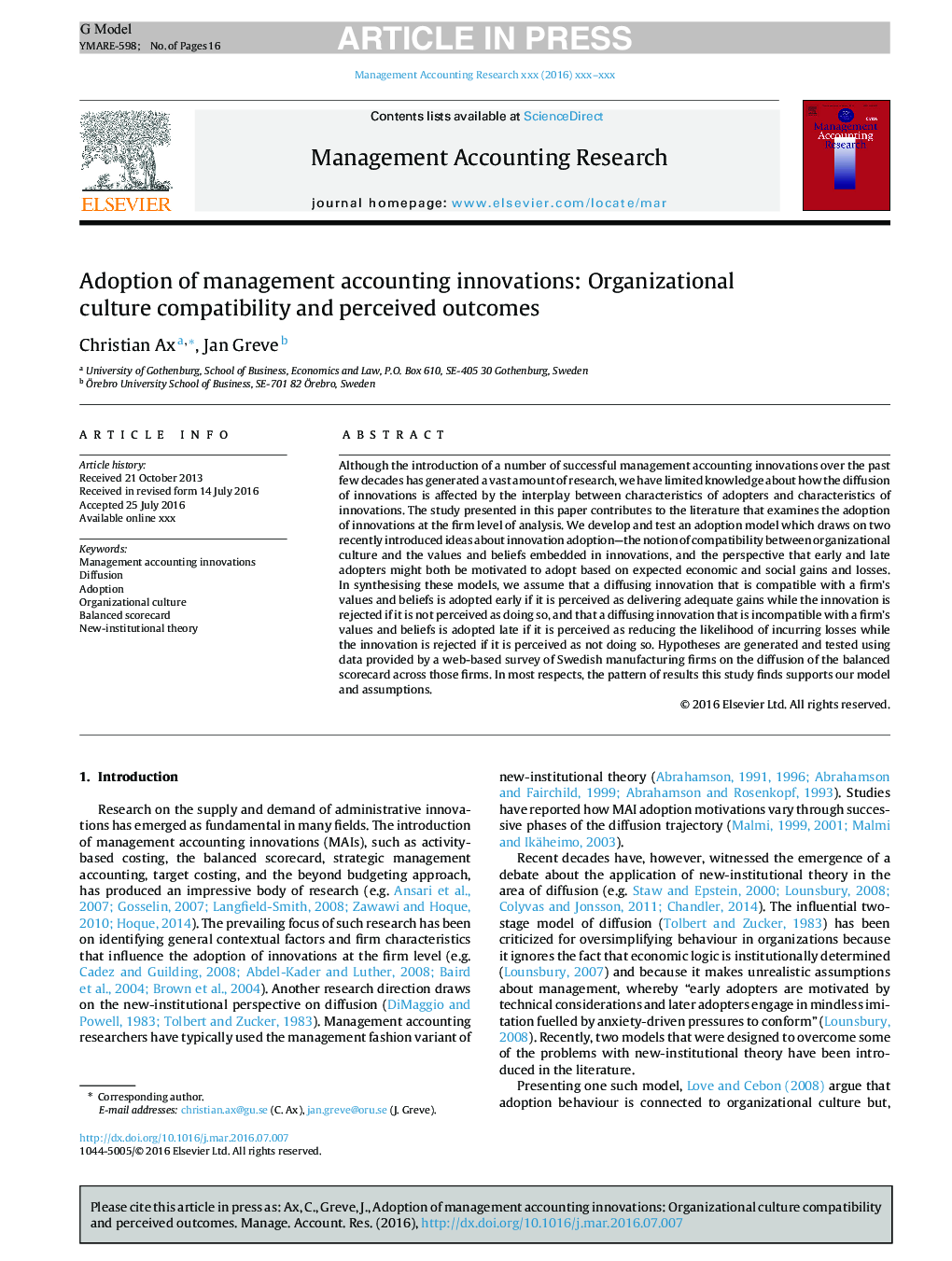| کد مقاله | کد نشریه | سال انتشار | مقاله انگلیسی | نسخه تمام متن |
|---|---|---|---|---|
| 5107224 | 1481778 | 2017 | 16 صفحه PDF | دانلود رایگان |
عنوان انگلیسی مقاله ISI
Adoption of management accounting innovations: Organizational culture compatibility and perceived outcomes
ترجمه فارسی عنوان
تصویب نوآوری های حسابداری مدیریت: سازگاری فرهنگ سازمانی و نتایج درک شده
دانلود مقاله + سفارش ترجمه
دانلود مقاله ISI انگلیسی
رایگان برای ایرانیان
کلمات کلیدی
نوآوری های حسابداری مدیریت، نفوذ، تصویب، فرهنگ سازمانی، کارت امتیازی متوازن، نظریه جدید نهادی،
ترجمه چکیده
اگر چه معرفی چندین نوآوری حسابداری مدیریت موفق در چند دهه گذشته، مقدار زیادی تحقیق را به وجود آورده است، ما دانش محدودی در مورد چگونگی انتشار نوآوری تحت تأثیر تعامل میان ویژگی های سازندگان و ویژگی های نوآوری ها قرار داریم. مطالعه ارائه شده در این مقاله به ادبیات کمک می کند که تصویب نوآوری را در سطح تحلیل شرکت بررسی می کند. ما یک مدل تصویب و تدوین را که بر دو ایده اخیر که در مورد تصویب نوآوری معرفی شده اند، ترسیم می کنیم: مفهوم سازگاری بین فرهنگ سازمانی و ارزش ها و باورهایی که در نوآوری ها تعبیه شده است، و دیدگاه هایی که ممکن است هر دو انگیزه اتخاذ شده در اوایل و اواخر بر مبنای سود و زیان اقتصادی و اجتماعی انتظار می رود. در ترکیب این مدل ها، فرض می کنیم که یک نوآوری پویا که با ارزش ها و باورهای شرکت سازگار است، به زودی تصدیق می شود، در صورتی که به عنوان دستیابی به دستاوردهای کافی در نظر گرفته شود، در حالی که نوآوری رد می شود، در صورتی که به این نکته نگریسته نشود، این است که با ارزش ها و باورهای شرکت سازگار نیست، اگر به این معناست که احتمال وقوع زیان ها را کاهش می دهد، در حالی که نوآوری را رد می کند، اگر آن را درک نمی کند. فرضیه ها تولید و آزمایش می شوند با استفاده از داده های ارائه شده توسط یک بررسی مبتنی بر وب از شرکت های تولیدی سوئدی در انتشار کارت امتیازی متوازن در میان این شرکت ها. در بیشتر موارد، الگوی نتایج این مطالعه پشتیبانی از مدل و مفروضات ما است.
موضوعات مرتبط
علوم انسانی و اجتماعی
مدیریت، کسب و کار و حسابداری
حسابداری
چکیده انگلیسی
Although the introduction of a number of successful management accounting innovations over the past few decades has generated a vast amount of research, we have limited knowledge about how the diffusion of innovations is affected by the interplay between characteristics of adopters and characteristics of innovations. The study presented in this paper contributes to the literature that examines the adoption of innovations at the firm level of analysis. We develop and test an adoption model which draws on two recently introduced ideas about innovation adoption-the notion of compatibility between organizational culture and the values and beliefs embedded in innovations, and the perspective that early and late adopters might both be motivated to adopt based on expected economic and social gains and losses. In synthesising these models, we assume that a diffusing innovation that is compatible with a firm's values and beliefs is adopted early if it is perceived as delivering adequate gains while the innovation is rejected if it is not perceived as doing so, and that a diffusing innovation that is incompatible with a firm's values and beliefs is adopted late if it is perceived as reducing the likelihood of incurring losses while the innovation is rejected if it is perceived as not doing so. Hypotheses are generated and tested using data provided by a web-based survey of Swedish manufacturing firms on the diffusion of the balanced scorecard across those firms. In most respects, the pattern of results this study finds supports our model and assumptions.
ناشر
Database: Elsevier - ScienceDirect (ساینس دایرکت)
Journal: Management Accounting Research - Volume 34, March 2017, Pages 59-74
Journal: Management Accounting Research - Volume 34, March 2017, Pages 59-74
نویسندگان
Christian Ax, Jan Greve,
